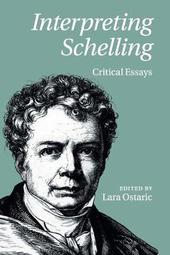
|
Interpreting Schelling: Critical Essays
Paperback / softback
Main Details
| Title |
Interpreting Schelling: Critical Essays
|
| Authors and Contributors |
Edited by Lara Ostaric
|
| Physical Properties |
| Format:Paperback / softback | | Pages:270 | | Dimensions(mm): Height 230,Width 153 |
|
| Category/Genre | Western philosophy - c 1600 to c 1900 |
|---|
| ISBN/Barcode |
9781108455268
|
| Classifications | Dewey:193 |
|---|
| Audience | | Professional & Vocational | |
|---|
| Illustrations |
Worked examples or Exercises
|
|
Publishing Details |
| Publisher |
Cambridge University Press
|
| Imprint |
Cambridge University Press
|
| Publication Date |
12 April 2018 |
| Publication Country |
United Kingdom
|
Description
This book is the first collection of essays on Schelling in English that systematically explores the historical development of his philosophy. It addresses all four periods of Schelling's thought: his Transcendental Philosophy and Philosophy of Nature, his System of Identity [Identitatsphilosophie], his System of Freedom, and his Positive Philosophy. The essays examine the constellation of philosophical ideas that motivated the formation of Schelling's thought, as well as those later ones for which his philosophy laid the foundation. They therefore relate Schelling's philosophy to a broad range of systematic issues that are of importance to us today: metaphysics, epistemology, aesthetics, ethics, our modern conceptions of individual autonomy, philosophy of history, philosophy of religion, political philosophy, and theology. The result is a new interpretation of Schelling's place in the history of German Idealism as an inventive and productive thinker.
Author Biography
Lara Ostaric is Assistant Professor of Philosophy at Temple University, Philadelphia. She has published on Schelling and Kant in Philosophisches Jahrbuch, Kantian Review, Kant-Studien, and Inquiry.
Reviews'Ostaric's is a commendable, valuable source of thought-provoking interpretations of many of the philosophical topics with which Schelling engages. It is thus a welcome addition to the continuing Anglophone renaissance of German idealist studies.' G. Anthony Bruno, Critique
|